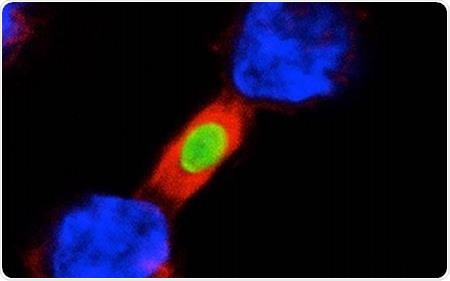The response of the immune system against infections is a delicate balance. Individuals require just enough action to remove the offensive viruses or bacteria, but not so much that their body suffer a considerable damage.

Two macrophages (blue) fighting to engulf the same pathogen (green). GIV/Girdin is shown in red. Image Credit: University of California, San Diego.
Macrophages are essentially immune cells at the front line, identifying pathogens and triggering an inflammatory reaction when required. Interpreting the way macrophages decide when to keep calm and when to become aggressive is crucial to identify new ways to achieve the right balance—especially in cases where inflammation becomes very severe, like in colitis, sepsis, and other autoimmune diseases.
Now, scientists from the University of California San Diego School of Medicine have found that a molecule, known as Girdin or GIV, serves as a brake on macrophages. The study was recently published in the Proceedings of the National Academy of Sciences on October 14th, 2020.
When the GIV gene was deleted from mouse macrophages, the immune cells instantly overacted to even trace amounts of a bacterial toxin or live bacteria. Mice with sepsis and colitis and also lacking the GIV gene in their macrophages fared worse.
The team also developed peptides that imitate the GIV gene, enabling them to turn off the mouse macrophages on command. When the mice were treated with the GIV-mimic peptide, their inflammatory response was tempered.
When a patient dies of sepsis, he or she does not die due to the invading bacteria themselves, but from an overreaction of their immune system to the bacteria. It’s similar to what we’re seeing now with dangerous ‘cytokine storms’ that can result from infection with the novel coronavirus SARS-CoV-2. Macrophages, and the cytokines they produce, are the body’s own immune-stimulating agents and when produced in excessive amounts, they do more harm than good.”
Pradipta Ghosh, MD, Study Senior Author and Professor, UC San Diego School of Medicine and Moores Cancer Center
Upon closer examination of the working mechanism, Ghosh and team found that the GIV protein usually cozies up to a molecule known as Toll-like receptor 4 (TLR4). The TLR4 is stuck right through the cell membrane, with bits poking outside and inside the cell.
In the cell exterior, TLR4 is similar to an antenna, looking for signs of the invading microbes. Within the cell, the GIV is nestled between the two “feet” of the receptor When the GIV is in place, it keeps the feet apart, and nothing happens. Upon removing the GIV, the feet of the TLR4 touch and trigger a cascade of immune-stimulating signals.
The GIV-mimicking peptides developed by Ghosh can occupy the place of the protein when it is missing, keeping the feet apart and calming down the macrophages.
We were surprised at just how fluid the immune system is when it encounters a pathogen. Macrophages don’t need to waste time and energy producing more or less GIV protein, they can rapidly dial their response up or down simply by moving it around, and it appears that such regulation happens at the level of gene transcription.”
Pradipta Ghosh, MD, Study Senior Author and Professor, UC San Diego School of Medicine and Moores Cancer Center
Ghosh is also the director of the Institute for Network Medicine and executive director of the HUMANOID Center of Research Excellence at UC San Diego School of Medicine.
Ghosh and group have planned to examine the factors that establish how the GIV brake continues to stay in position when macrophages are resting or is cleared to mount a response to a credible threat.
To facilitate these studies, the Institute for Network Medicine at UC San Diego School of Medicine was recently awarded a new $5 million grant from the National Institute of Allergy and Infectious Diseases, which is part of the National Institutes of Health.
Ghosh shares this award with her collaborators Debashis Sahoo, PhD, an assistant professor form UC San Diego School of Medicine and Jacobs School of Engineering, and Soumita Das, PhD, associate professor of pathology from UC San Diego School of Medicine.
Source:
Journal reference:
Swanson, L., et al. (2020) TLR4 signaling and macrophage inflammatory responses are dampened by GIV/Girdin. PNAS. doi.org/10.1073/pnas.2011667117.